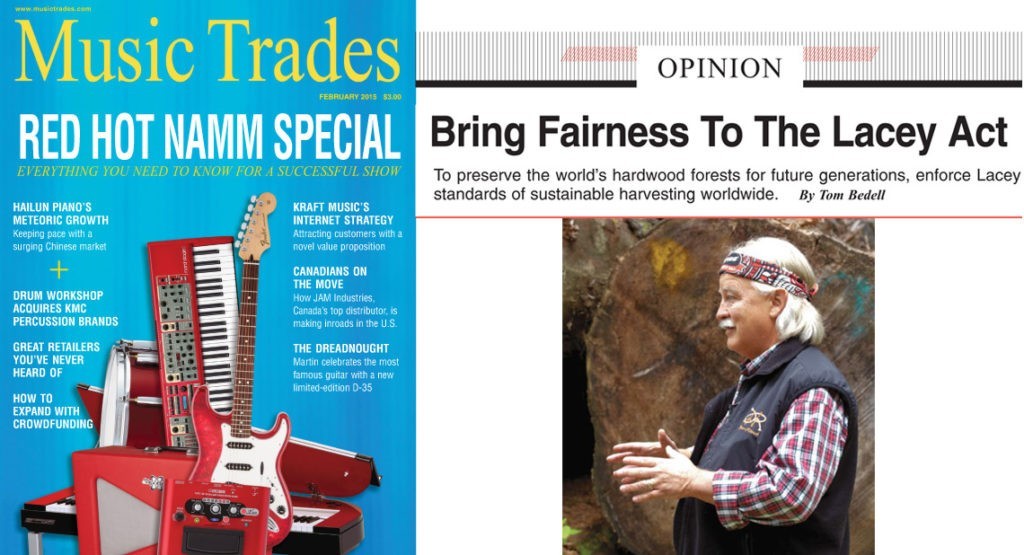Tom Bedell Writes Guest Editorial for Music Trades Magazine

Written by Tom Bedell
Published in Music Trades, February 2015 Issue
I WAS RECENTLY IN A MEETING with Senator Ron Wyden to discuss the impact of the 2008 amended Lacey Act on the acoustic stringed instrument industry. Wyden is one of the principle authors of the amendments that expanded the Lacey Act from covering just trafficking in wildlife to the import, export, and trade of plant material in general, and wood specifically.
Following the passage of these amendments and the subsequent 2009 raid on Gibson factories in Nashville and Memphis where rosewood and ebony were seized, the m.i. industry has debated the Lacey Act. Are the new requirements and accountability for verifying the chain of custody of wood and its legal harvest a case of governmental over-reach that unfairly burdens free enterprise? Or are they a necessary and appropriate response for protecting the world’s hardwood and rain forests?
Before returning to the acoustic guitar industry in 2009, I spent 30 years manufacturing and marketing sport fishing tackle. In addition to our USA operations, we owned distribution companies in 22 other countries and marketed our fishing tackle throughout the world. As the purpose of our products was to help anglers catch more fish, our growth depended on the quality of the world’s aquatic and fishery resources. I personally was engaged with governmental and conservation organizations worldwide to champion policy that would sustain and enhance fishing opportunities. My company’s success and growth depended on it.
How is the acoustic guitar industry different? It is not. The tonewoods in the extraordinary musical instruments we craft are gifts from unique hardwood and rain forests. For us to enable future generations to continue creating magnificent acoustic instruments, we must all join together to harvest and salvage woods in a way that is consistent with sustaining the forests. Out of self-interest, if nothing else, we should be doing this regardless of the provisions of the Lacey Act or the rules outlined by the Congress on International Trade in Endangered Species Convention (CITES). These governmental requirements merely ensure that we all accept this responsibility and conduct our businesses accordingly.
But this raises the issue I presented to Senator Wyden. The Lacey Act applies to USA companies: manufacturers, distributors, and retailers. It does not apply to manufacturers in foreign countries. So while USA acoustic instrument manufacturers accept the added responsibility and overhead to adhere to Lacey Act requirements, the acoustic instrument manufacturers in Indonesia, Korea, and China do not. China, Indonesia, and South Korea have all become CITES member parties, indicating their recognition of the need to regulate trade in plant and wildlife species, but they have not created and implemented legislation to effectively enforce CITES compliance in timber trade, as the amended Lacey Act now does for the U.S. and similar timber regulations do for the European Union.
The accountability and due diligence principles in the Lacey Act need to be applied worldwide. Senator Wyden made it clear there would be no weakening or amending to the current Lacey Act. I encouraged him to take his zeal for protecting the world’s forests to the world. We need his outspoken leadership to expand his legislation to actually protect the world’s forests by not allowing Asian companies to harvest at will. In other words, make them abide by the same rules that govern U.S.-based companies.
In addition to encouraging the U.S. government and NGOs to fight for worldwide compliance under the same rules and regulations, many of us can make a difference as well. All of the companies dealing in instruments from Asian manufacturers can insist that their suppliers perform the due diligence necessary to confirm that all of the tonewoods in their imported instruments were legally harvested. This will not completely achieve parity nor guarantee the protection of the world’s forests, but it will be a giant step forward.
